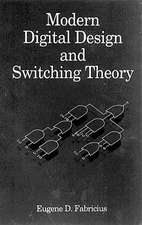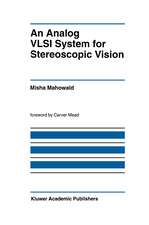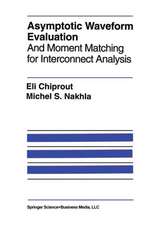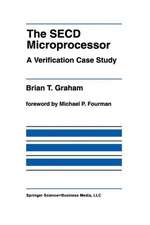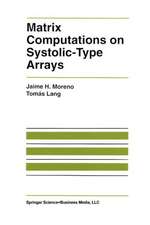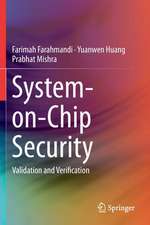Hardware Security Primitives
Autor Mark Tehranipoor, Nitin Pundir, Nidish Vashistha, Farimah Farahmandien Limba Engleză Paperback – 16 dec 2023
- Provides guidance and security engineers for protecting their hardware designs;
- Covers a variety digital and analog hardware security primitives and applications for securing modern devices;
- Helps readers understand PUF, TRNGs, silicon odometer, and cryptographic hardware design for system security.
| Toate formatele și edițiile | Preț | Express |
|---|---|---|
| Paperback (1) | 474.63 lei 6-8 săpt. | |
| Springer International Publishing – 16 dec 2023 | 474.63 lei 6-8 săpt. | |
| Hardback (1) | 650.37 lei 6-8 săpt. | |
| Springer International Publishing – 16 dec 2022 | 650.37 lei 6-8 săpt. |
Preț: 474.63 lei
Preț vechi: 558.39 lei
-15% Nou
Puncte Express: 712
Preț estimativ în valută:
90.82€ • 95.06$ • 75.59£
90.82€ • 95.06$ • 75.59£
Carte tipărită la comandă
Livrare economică 31 martie-14 aprilie
Preluare comenzi: 021 569.72.76
Specificații
ISBN-13: 9783031191879
ISBN-10: 3031191870
Pagini: 350
Ilustrații: XVII, 350 p. 147 illus., 140 illus. in color.
Dimensiuni: 155 x 235 mm
Greutate: 0.52 kg
Ediția:1st ed. 2023
Editura: Springer International Publishing
Colecția Springer
Locul publicării:Cham, Switzerland
ISBN-10: 3031191870
Pagini: 350
Ilustrații: XVII, 350 p. 147 illus., 140 illus. in color.
Dimensiuni: 155 x 235 mm
Greutate: 0.52 kg
Ediția:1st ed. 2023
Editura: Springer International Publishing
Colecția Springer
Locul publicării:Cham, Switzerland
Cuprins
Introduction.- Hardware Security Primitives and their Applications.- Racetrack PUF.- TERO PUF.- Direct Characterization PUF.- Volatile Memory Based PUF.- Emerging Memory Based PUF.- Extrinsic Characterization of PUF.- Radio PUFs and CoAs.- Optical PUFs.- True Random Number Generators.- Hardware Camouflaging.- Temper Detection Methods.- Embedded Watermarking.- Counterfeit and Recycled IC Detection.- Package-Level Counterfeit IC Detection.- Side Channels Protection in Cryptographic Hardware.- Fault Injection Resistant Cryptographic Hardware.- Energy and Performance Optimization for Cryptography.- Lightweight Cryptography.- Post-Quantum Cryptography.- Virtual Proof of Reality.- Analog Security.
Notă biografică
Mark Tehranipoor received his Ph.D. from the University of Texas at Dallas in 2004. He is currently the Intel Charles E. Young Preeminence Endowed Chair Professor in Cybersecurity at the University of Florida. His current research projects include: hardware security and trust, supply chain security, IoT Security, VLSI design, test and reliability. Dr. Tehranipoor has published over 400 journal articles and refereed conference papers and has given about 200 invited talks and keynote addresses. He has published 11 books and more than 20 book chapters. He is a recipient of a dozen best paper awards and nominations, as well as the 2008 IEEE Computer Society (CS) Meritorious Service Award, the 2012 IEEE CS Outstanding Contribution, the 2009 NSF CAREER Award, and the 2014 AFOSR MURI award. He serves on the program committee of more than a dozen leading conferences and workshops. He has also served as Program Chair of a number of IEEE and ACM sponsored conferences and workshops (HOST, ITC, DFT, D3T, DBT, NATW, and more). He co-founded the IEEE International Symposium on Hardware-Oriented Security and Trust (HOST) and served as HOST-2008 and HOST-2009 General Chair. He is currently serving as a founding EIC for Journal on Hardware and Systems Security (HaSS) and Associate Editor for JETTA, JOLPE, IEEE TVLSI and ACM TODAES. Prior to joining UF, Dr. Tehranipoor served as the founding director for CHASE and CSI centers at the University of Connecticut. He is currently serving as a founding director for Florida Institute for Cybersecurity Research (FICS). Dr. Tehranipoor is a Fellow of the IEEE, a Golden Core Member of IEEE CS, and Member of ACM and ACM SIGDA.
Nidish Vashistha is currently an R&D Yield Enhancement and Physical Failure Analysis Engineer for developing next-generation NAND memory devices at Micron. He received his Ph.D. in Electrical and Computer Engineering in 2022 and MS in 2017 from the University of Florida. His previous work experience includes working as a Product and Test Engineering Intern at Renesas Electronics America and RF Engineer at Ericsson. His research area includes secure integrated circuits design and trust validation using SEM nano-imaging, computer vision, and machine learning. Besides, he has contributed his research expertise to develop an ecosystem for trusted microelectronics by performing vulnerability risk assessment and mitigation through blockchain. He has authored several papers, articles, and book chapters in his research areas. His research work was recognized as an invited paper in IEEE ITC 2019, nominated for the best paper award in IEEE HOST 2019, and audience choice best demo award in IEEE HOST 2022. In addition, he is a co-inventor of Trojan Scanner. He has been an IEEE member for 14 years. He also serves as a peer reviewer in HaSS, ACM JETCS, TCAS-1, and TSP journals.
Farimah Farahmandi is an assistant professor in the Department of Electrical andComputer Engineering at the University of Florida. She received her Ph.D. from the Department of Computer and Information Science and Engineering at the University of Florida, 2018. She received her B.S. and M.S. from the Department of Electrical and Computer Engineering at the University of Tehran, Iran, in 2010 and 2013, respectively. Her research interests include design automation of System-on-Chips and energy-efficient systems, formal verification, hardware security validation, and post-silicon validation and debug. Her research has resulted in two books, seven book chapters, and several publications in premier ACM/IEEE journals and conferences, including IEEE Transactions on Computers, IEEE Transactions on CAD, Design Automation Conference (DAC), and Design Automation and Test in Europe (DATE). Her research has been recognized by several awards, including IEEE System Validation and Debug Technology Committee Student Research Award, Gartner Group Info-Tech Scholarship, a nomination for the Best Paper Award in ASPDAC 2017, and DAC Richard Newton Young Student Fellowship. She has actively collaborated with various research groups (IBM, Intel, and Cisco) that have led to several joint publications. She currently serves as an Associate Editor of IET Computers & Digital Techniques. She also has served on many technical program committees as well as organizing committees of premier ACM and IEEE conferences. Her research has been sponsored by SRC, AFRL, DARPA, and Cisco. She is a member of IEEE and ACM.
Nidish Vashistha is currently an R&D Yield Enhancement and Physical Failure Analysis Engineer for developing next-generation NAND memory devices at Micron. He received his Ph.D. in Electrical and Computer Engineering in 2022 and MS in 2017 from the University of Florida. His previous work experience includes working as a Product and Test Engineering Intern at Renesas Electronics America and RF Engineer at Ericsson. His research area includes secure integrated circuits design and trust validation using SEM nano-imaging, computer vision, and machine learning. Besides, he has contributed his research expertise to develop an ecosystem for trusted microelectronics by performing vulnerability risk assessment and mitigation through blockchain. He has authored several papers, articles, and book chapters in his research areas. His research work was recognized as an invited paper in IEEE ITC 2019, nominated for the best paper award in IEEE HOST 2019, and audience choice best demo award in IEEE HOST 2022. In addition, he is a co-inventor of Trojan Scanner. He has been an IEEE member for 14 years. He also serves as a peer reviewer in HaSS, ACM JETCS, TCAS-1, and TSP journals.
Farimah Farahmandi is an assistant professor in the Department of Electrical andComputer Engineering at the University of Florida. She received her Ph.D. from the Department of Computer and Information Science and Engineering at the University of Florida, 2018. She received her B.S. and M.S. from the Department of Electrical and Computer Engineering at the University of Tehran, Iran, in 2010 and 2013, respectively. Her research interests include design automation of System-on-Chips and energy-efficient systems, formal verification, hardware security validation, and post-silicon validation and debug. Her research has resulted in two books, seven book chapters, and several publications in premier ACM/IEEE journals and conferences, including IEEE Transactions on Computers, IEEE Transactions on CAD, Design Automation Conference (DAC), and Design Automation and Test in Europe (DATE). Her research has been recognized by several awards, including IEEE System Validation and Debug Technology Committee Student Research Award, Gartner Group Info-Tech Scholarship, a nomination for the Best Paper Award in ASPDAC 2017, and DAC Richard Newton Young Student Fellowship. She has actively collaborated with various research groups (IBM, Intel, and Cisco) that have led to several joint publications. She currently serves as an Associate Editor of IET Computers & Digital Techniques. She also has served on many technical program committees as well as organizing committees of premier ACM and IEEE conferences. Her research has been sponsored by SRC, AFRL, DARPA, and Cisco. She is a member of IEEE and ACM.
Textul de pe ultima copertă
This book provides an overview of current hardware security primitives, their design considerations, and applications. The authors provide a comprehensive introduction to a broad spectrum (digital and analog) of hardware security primitives and their applications for securing modern devices. Readers will be enabled to understand the various methods for exploiting intrinsic manufacturing and temporal variations in silicon devices to create strong security primitives and solutions. This book will benefit SoC designers and researchers in designing secure, reliable, and trustworthy hardware.
- Provides guidance and security engineers for protecting their hardware designs;
- Covers a variety digital and analog hardware security primitives and applications for securing modern devices;
- Helps readers understand PUF, TRNGs, silicon odometer, and cryptographic hardware design for system security.
Caracteristici
Provides guidance and security engineers for protecting their hardware designs Covers a variety digital, analog and quantum hardware security primitives and applications for securing modern devices Helps readers understand PUF, TRNGs, silicon odometer, and cryptographic hardware design for system security











